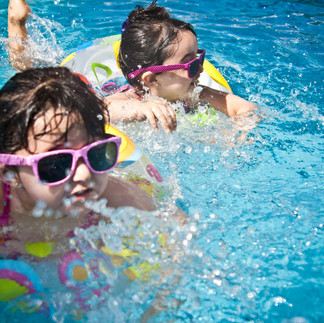
As the temperatures rise, many of us head to pools, lakes, and oceans to cool off and enjoy the water. Swimming is a great way to beat the heat and have fun, but it's crucial to prioritize safety. Here are ten essential swimming safety tips to help ensure your summer is both enjoyable and accident-free.
1. Always Supervise Children
Children should never be left unattended near water. Drowning can happen quickly and quietly. Designate a responsible adult to actively supervise kids at all times, whether they're in the pool, ocean, or even a bathtub.
2. Learn to Swim
One of the best ways to stay safe in the water is to know how to swim. Enroll yourself and your children in swimming lessons. Knowing how to swim not only provides a fun activity but also an essential life-saving skill.
3. Know the Water
Before jumping in, make sure you're familiar with the water you're about to swim in. In natural bodies of water, such as lakes, rivers, or oceans, be aware of currents, tides, and underwater hazards. In pools, ensure the depth is appropriate for diving or jumping.
4. Use Life Jackets
For non-swimmers or weak swimmers, wearing a life jacket can be a lifesaver. Ensure that life jackets are Coast Guard-approved and fit properly. Even strong swimmers can benefit from wearing a life jacket when participating in water sports.
5. Swim with a Buddy
Swimming alone is never a good idea. Always swim with a buddy, especially in natural bodies of water. In case of an emergency, having someone there can make a critical difference.
6. Avoid Alcohol
Alcohol impairs judgment, balance, and coordination. Drinking while swimming or supervising children can be dangerous. Save the drinks for after the water activities to ensure everyone's safety.
7. Know CPR
Learning CPR can be a life-saving skill. In case of a water emergency, knowing how to perform CPR can keep someone alive until professional help arrives. Many organizations offer CPR certification courses that you can complete in just a few hours.
8. Follow Pool Rules
Public pools have rules in place for a reason. Follow posted signs and instructions from lifeguards. Common rules include no running, no diving in shallow water, and no rough play. These rules are designed to keep everyone safe.
9. Protect Against the Sun
While enjoying the water, don't forget to protect yourself from the sun. Apply waterproof sunscreen regularly, wear a hat, and use UV-protective clothing. Staying in the shade during peak sun hours can also help prevent sunburn and heat-related illnesses.
10. Stay Hydrated
Swimming might make you feel cool, but it’s still easy to get dehydrated. Drink plenty of water throughout the day, especially if you're spending extended time in the sun and water. Avoid sugary and caffeinated beverages, which can contribute to dehydration.











